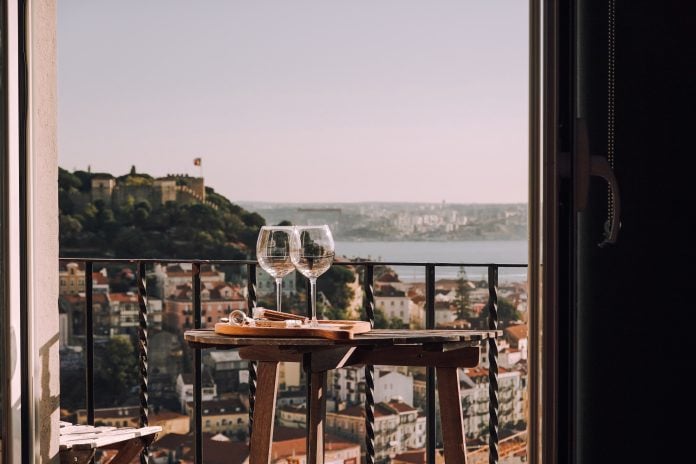Dating looks different depending on where you are located on the globe. Cultural differences, views on romance, gender roles, and family are a few of the many factors that impact a country’s dating scene.
Dating in Portugal is not relatively different than in other Southern European countries but is vastly distinctive from dating in the United States, for example.
To better understand dating in Portugal, our guide will help you navigate this new dating scene. From how to find a date, marriage, dating etiquette, and more, this guide has everything you need to know to tackle your love life.
Finding a Date in Portugal
There are two main ways to approach dating and finding a date in Portugal. One is to meet someone through online dating, which is becoming more popular in Portugal. On the other hand, you can also meet people the old-fashioned way and more organically.
It’s important to note that dating does not look the same all over the country. There will be some areas where finding a suitable date is more difficult as the dating pool is smaller, particularly for the LGBT+ community.
However, in cities like Porto and Lisbon, meeting a partner is a lot easier, both in person and online.
Online Dating
If you had asked us five years ago, online dating in Portugal was not very common. Many single people did not have profiles on dating apps. There was a stigma surrounding apps like Tinder, and many looked down upon those who had these dating apps.
However, in recent years, online dating has become more socially acceptable, and most single people will have some sort of app downloaded on their phone.
While the numbers might not be as large as in cities like Berlin and London, it’s common for those in Lisbon and Porto to date online.
This is the case for many Portuguese cities, but again, the online dating pool in rural areas might be tiny.
You will also find many internationals on dating apps, as well as digital nomads and tourists.

Here are the most popular dating apps in Portugal:
- Tinder: Tinder is probably the most popular dating app in Portugal.
- Bumble: Bumble is a great alternative where it’s up to women to start the conversation within 24 hours.
- Hinge: Less popular but on the rise, Hinge focuses on getting people to connect in person.
Meeting People in Portugal
If your dream of finding the right person is to do so organically, this is still popular in Portugal. However, while the Portuguese are friendly people, if you wish to meet someone at a coffee shop, this is not that likely.
The Portuguese do not often come up to you like that and ask you out in a flirtatious matter. Unfortunately, harassment in Lisbon and Porto is prevalent, but we do not consider that to be on the topic of flirting and dating here.
You are more likely to meet someone or get a date if you are a part of your Portuguese city’s nightlife, like heading to a bar or club.
If this isn’t the right environment for you to find a partner, don’t despair. Join an activity like yoga, surfing, or another sport. Alternatively, find local meet-ups for expats which might be hosting events.

Dating Etiquette in Portugal
The most common date scenario in Portugal is going out for a coffee This tends to be a first date scenario, and then you move on to other activities such as going to bars, restaurants, beaches, or parks. This is not always the case but tends to be a pattern.
Here are a few tips for your next date in Portugal:
- Be punctual: Forget the assumption that the Portuguese are late, you must be on time for a date
- Learn the greetings: Men and women kiss on the cheek, and men and men tend to handshake but also give hugs. Do what feels best, but learn the etiquette so that you know what to expect.
- Dress according to the dating scenario: You might be overdressing if you are in heels or underdressing if you are in shorts and sandals.
- Splitting the bill: It is common for people to split the bill, regardless of gender. If someone offers to pay, the other will usually take care of the bill next time. However, older men tend to want to pay the bill.
- Ask questions about your date, monologues are frowned upon

Dating a Portuguese Person
Dating a Portuguese person does not look a specific way, as everyone is different. The Portuguese are not a monolith. However, you might find that there are different social and cultural norms when it comes to dating a Portuguese person.
It is said that Portuguese men are not very romantic, particularly when it comes to gift-giving and celebrating holidays like Valentine’s Day. Family is very important to them, and you are likely to meet them. Many argue that Portuguese men are “mama’s boys.”
Portuguese women tend to be very independent. This doesn’t mean, however, that they are not romantic. On the contrary, they are passionate and have been taught to show their emotions.
Again, take these with a grain of salt, as everyone is different.
Dating in Portugal: The Importance of Family
As you may have noticed, family is very important in Portugal. If you are in a serious relationship with a Portuguese person, in a way, you are also “dating” their family. It’s commonplace for families to have a meal together every week. You will be included in these events and made to be part of the family.
If a family member needs help, particularly a grandparent, as a partner, you are also expected to be there for them. Your in-laws are very important. You are expected to always show them respect and develop a close relationship with them.
Marriage and Children
In 2021, the average age of marriage in Portugal was 34.3 years of age for males and 32.9 years of age for females. While in the United States, it’s common for people to get married at 28 or even earlier, the Portuguese tend to get married later. Still, there will be cases of younger marriages, particularly in more religious communities.
Unfortunately, Portugal has the second highest divorce rate in Europe, with 58.7 divorces per 100 marriages.
When it comes to having children, Portugal has one of the lowest birth rates in the EU, standing at 7.7% in 2021. The birth rate has been decreasing exponentially since the 1950s. The average age that a mother has her first child in Portugal is 29.9 years old, a number that has been rising.

Proposals in Portugal
Proposals in Portugal are different than in other countries, such as the US and the UK. Proposals tend not to be as grand and romantic, with thousands of euros spent for the occasion.
Portuguese proposals tend to be more intimate and simple. Surprise proposals are also less rare. Let’s say that you might not be so surprised you are getting proposed to. Conversations around marriage will happen for a while before a proposal.
However, if you are planning a romantic proposal in Portugal, the country has a lot to offer. From beautiful cliffs in the Algarve and beaches to the Douro valley, Portuguese landscapes will make a dramatic landscape to this important moment.
Legal Marriage vs. Domestic Partnership
Getting legally married is not your only option. Many couples opt for a domestic partnership instead. A domestic partnership, known as A De Factor Partnership, is not a marital status but a recognition that has similar effects to marriage.
Domestic Partnership in Portugal
A domestic partnership is applicable to couples living in the same house together for at least two years. They must show they are a couple who share a life together in the same house. The main difference is that in a domestic partnership, unmarried couples are not heirs to each other.
A non-martial partnership ends when one of the partners dies, one of the partners gets married, or by the will of either of the partners. Keep in mind that this partnership is not a valid condition for a foreign person to apply for Portuguese nationality.
What are the advantages of a domestic partnership?
- Submit a joint personal income tax with the same rights as married people
- Protection of the home they live in. If a partner who owns the house dies, the other person is allowed to live in the home where they lived prior with the deceased. They are allowed to live in the house for five years after the death or for as many years as the partnership lasted if the partnership was over five years old.
- Widow allowance if the partner dies
- Other benefits similar to married people in regard to absences, leaves, and holidays.
Marriage in Portugal
In Portugal, a marriage is a contract between two people who want to share their lives. The contract includes the rights and duties of both partners. It only ends with divorce or the death of one of the persons.
People over the age of 18 who are not first-degree relatives can get married. You can get married from the age of 16 with the permission of a legal guardian.
There are different types of marriage, including a civil, catholic, or civil under a religious form marriage.
In Portugal, married couples are entitled to 15 days of marriage leave, taken consecutively from the date on which the wedding takes place.
Property Schemes: Prenups in Portugal
When a couple gets married, they can choose whether they share common assets or separate these. They must select a property scheme which is a set of rules stating what belongs to the couple and what belongs to each person in the case of divorce.
If you do not want to choose one, the Communion of Acquired Property is automatically applied. In this scenario, all assets that the couple acquired after the marriage are owned by both people. This does not include inheritances, donations, and salaries, as well as assets acquired prior to the marriage. For example, if, after getting married, one of the individuals buys a house, it belongs to the couple.
There is a scheme called the General Communion of Property that says that all assets belong to the couple. This includes assets acquired before and after the marriage. This does not include inheritances, donations, and personal objects.
Another scheme is the Separation of Property. In this scheme, there are no assets that automatically belong to the couple. Each person keeps the assets acquired before or after the marriage. To own assets together, they would need to buy them in co-ownership.
However, this scheme does not apply to inheritances. If one of the persons dies, the widowed is always entitled to the part of the inheritance they are legally owed. This scheme is compulsory for spouses over 60 years of age.
Alternatively, couples can create their own property schemes through a prenuptial agreement, choosing the characteristics of the schemes they prefer. Their own scheme needs to respect the law.
Having a Child in Portugal
The Portuguese are having fewer children and choosing to start a family later in life. Is Portugal still a good place to have a baby?
Yes. Portugal has a strong public health care system which makes it essentially free to have a child (if you are a resident).
The quality education system, public parks, and sunny weather make Portugal one of the best countries in Europe to start a family.
The Portuguese government is also planning to implement measures to fight the decline in the birth rate. Along with free childcare, the government will provide fiscal deductions for families with children, as well as free textbooks and free computers.
Being pregnant in a country where you are granted basic rights and protections fosters a positive experience. Pregnant women have health and employment rights in Portugal, many of which are inexistent in the US and UK, unfortunately. Both parents have a right to parental leave.
Will my baby get Portuguese citizenship?
If, as a foreigner, you have a baby in Portugal, your child might be eligible for Portuguese citizenship. The child will receive citizenship automatically if one of the parents was born in Portugal or if they don’t have any other nationality through their parents.
They can also get automatic citizenship if at least one parent has lived in Portugal for five years at the time of birth. You must prove this when registering the birth of your child.
Alternatively, a child can apply for citizenship if they have lived in the country for six years. However, they must take a Portuguese language test and not have been convicted of a crime with a sentence of over three years.



